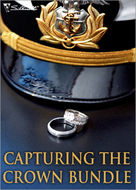Czytaj książkę: «Four Regency Rogues»
Four Regency Rogues
The Earl and The Hoyden
Mary Nichols
The Captain’s Forbidden Miss
Margaret McPhee
Miss Winbolt and The Fortune Hunter
Sylvia Andrew
Captain Fawley’s Innocent Bride
Annie Burrows

MILLS & BOON
Before you start reading, why not sign up?
Thank you for downloading this Mills & Boon book. If you want to hear about exclusive discounts, special offers and competitions, sign up to our email newsletter today!
Or simply visit
Mills & Boon emails are completely free to receive and you can unsubscribe at any time via the link in any email we send you.
Table of Contents
Cover
Title Page
The Earl and The Hoyden
Excerpt
About the Author
Chapter One
Chapter Two
Chapter Three
Chapter Four
Chapter Five
Chapter Six
Chapter Seven
Chapter Eight
Chapter Nine
Chapter Ten
The Captain’s Forbidden Miss
Excerpt
About the Author
Author Note
Chapter One
Chapter Two
Chapter Three
Chapter Four
Chapter Five
Chapter Six
Chapter Seven
Chapter Eight
Chapter Nine
Chapter Ten
Chapter Eleven
Chapter Twelve
Chapter Thirteen
Chapter Fourteen
Epilogue
Miss Winbolt and The Fortune Hunter
Excerpt
About the Author
Dedication
Chapter One
Chapter Two
Chapter Three
Chapter Four
Chapter Five
Chapter Six
Chapter Seven
Chapter Eight
Chapter Nine
Chapter Ten
Chapter Eleven
Chapter Twelve
Chapter Thirteen
Chapter Fourteen
Chapter Fifteen
Epilogue
Captain Fawley’s Innocent Bride
Excerpt
About the Author
Dedication
Chapter One
Chapter Two
Chapter Three
Chapter Four
Chapter Five
Chapter Six
Chapter Seven
Chapter Eight
Chapter Nine
Chapter Ten
Chapter Eleven
Chapter Twelve
Chapter Thirteen
Copyright
The Earl and The Hoyden
Mary Nichols
‘Goodnight, Miss Cartwright. And thank you for an evening far more enjoyable than I ever expected it to be.’
He took her hand and lifted it to his lips, lingering a little over the kiss, wishing he dared kiss her properly but knowing he would be forever damned if he did.
It was several seconds before she could repossess herself of her hand, and by that time she was tingling with a sensation she could not describe. It was a feeling of being on the verge of something so exciting she was shivering. Her stomach was churning, her heart beating so fast she could hardly breathe, and her toes and fingers curled involuntarily. She climbed into the curricle without ever knowing how she got there. This man was dangerous! He threatened everything she stood for. She must be on her guard, always on her guard, lest he undermine her confidence and the tenets by which she lived crumbled to nothing.
She flicked the reins and, as the pony started forward, trotted round the circle before the door and out of the gate she found herself murmuring, ‘Remember whose daughter you are, Charlie Cartwright. And remember whose son he is.’
Born in Singapore, MARY NICHOLS came to England when she was three, and has spent most of her life in different parts of East Anglia. She has been a radiographer, school secretary, information officer and industrial editor, as well as a writer. She has three grown-up children, and four grandchildren.
Chapter One
1814
Seven o’clock on a fine spring morning was the best time in all the world to be out riding, Charlotte decided, as Bonny Boy took her over the park surrounding Mandeville and into the woods above it, where the soft ground deadened the sound of his galloping hooves. It was good to be home again after the uncomfortable heat of Jamaica and the unpleasantly rough voyage, though, thank goodness, she had not succumbed to seasickness. She had missed the worst of the long hard winter, although the Atlantic had given her a taste of it as they buffeted their way homewards in the Fair Charlie.
On one side of her, the wooded slopes, a mixture of dark green conifers and deciduous trees just beginning to show their pale green hid Mandeville from view. On the other, the heather-covered hills separated Mandeville from Amerleigh. The heather was not yet in bloom, but the gorse brightened the terrain with its butter-coloured blooms. Mandeville was hers, and had been ever since her father’s death two years before, along with the cotton mill at Scofield, five miles distant; the Jamaican plantation; the Fair Charlie—a slaver that, since the abolition of the abominable trade, had become an ordinary trading schooner—together with the lead mine under the ground over which she was riding, though that had become so deep and so frequently flooded it was hardly profitable. Did having all that make the sacrifices worthwhile?
What had she sacrificed? Her girlhood, perhaps. Her chance of marriage and children because she was well aware that her mode of living would put all but the most desperate and greedy off courting her. And the desperate and greedy she was easily able to rebuff. She did not want to marry; marriage meant handing everything she owned over to her husband and becoming his property, just as the plantation slaves had been her property, to do with as she pleased. She had been aware of the injustice of that long before her father died, but he always said he could not afford to give them their freedom; he needed their labour to produce the sugar on which a large proportion of his wealth was founded. ‘Besides,’ he had said, ‘free men can be dismissed if they do not work hard enough and that means they also lose their homes. They know they are better off as they are.’ Being a child at the time, a child brought up to believe her papa was never wrong, she had accepted his argument. A year after his funeral she had taken the long voyage to the West Indies to see things for herself.
The conditions in which the slaves lived and their treatment by the overseers had appalled her. She had offered them freedom, but as they had nowhere else to go, she had given them a weekly wage to remain in her employ. Daniel Mortlock, her plantation manager, had told her that acting arbitrarily would make the slaves on neighbouring plantations discontented and ready to cause trouble, but she had simply said what her neighbours did was no concern of hers, but if they had an ounce of humanity they would follow her example. She was adamant no human being ought to own another and he had been obliged to back down.
If she had a husband, everything would be in his hands and she was not prepared to forgo her independence. Not for anyone. Her biggest regret was that she would have no children. She told herself she would have to make do with other people’s children and that included the villagers and those who worked in her mill, but it could never be the same as having a child of her own, someone she could love, as only a mother can love a child.
If her mama had not died giving birth to her, things might have been different. She might have had brothers and sisters and her mama would have guided her, taught her how to behave, brought her up to be a lady, seen her safely married, and her brothers would have taken over from her father. Instead, her father had treated her as the son he never had, making no allowances for her femininity. He had called her Charlie, which she had accepted as his playfulness, but she knew now it was more than that. It was a refusal to see her as a daughter, when all he wanted was a boy in his own image.
She supposed he had loved her in his way, but he had never told her so, never by so much as a kiss on the cheek let it show. Sometimes, when she was small, she had lavished her affection on her governesses, but they had been chosen by her father for their strictness and practicality and she had been rebuffed. She had soon learned not to show her feelings. But the gentler side of her nature could not quite be stifled and she could, and did, show compassion to those less fortunate and could never be cruel to any living thing, human or beast.
She had become a fearless rider, fished the swirling rivers and hunted over the hills and dales. She was a good shot with both pistol and shotgun, and was not above acting as midwife to horses, sheep and dogs. Encouraged by her father, she had developed a good business head and was perfectly conversant with bookkeeping and accounts, a fact that sometimes flummoxed Jacob Edwards, her legal adviser, and William Brock, the mill manager, and had certainly shocked the manager of her plantation when she visited Jamaica. Oh, it was good to be home again!
She was so deep in thought she did not hear other thundering hooves until a rider suddenly appeared out of the trees to the side of the path she was using and caused Bonny Boy to rear. It took all her strength and skill to keep her seat and bring him under control, while the other rider had his work cut out to pull his own mount to a halt.
‘You confounded idiot!’ he exclaimed, still wrestling with the reins and not looking at her. ‘What, in heaven’s name, were you thinking of, racing about like a madman? You could have killed me.’
‘And you me.’
The sound of a female voice made him turn and look at her. What he saw caused him to stare in amazement. The figure riding astride the big horse was a woman, there was no doubt of it, but what a woman! Dressed in a man’s riding coat, her only concession to womanhood an open riding skirt, which revealed tan leather breeches and brown riding boots. In spite of his annoyance he could not help admiring her long shapely leg. Neither did she seem to subscribe to the feminine insistence of shielding her face from the sun because she was hatless and her skin was tanned and glowing. Her abundance of chestnut-coloured hair, streaked with the red of sunrise, had escaped from its pins and drifted across her face in wild curls. Her eyes were neither brown nor green, but a mixture of both, and they were regarding him angrily.
‘One does not expect to come across a lady jockey on one’s own land,’ he said, affecting annoyance, though he felt bound to acknowledge her skill in controlling her mount. ‘Especially one set on winning a race…’
‘I was galloping, not racing,’ she snapped. ‘If you had been looking where you were going instead of jumping out on me like some highwayman—’ She stopped suddenly to look more closely at him. He was a large man on a very big horse and towered over her. He was wearing a dark green uniform, its jacket decorated with black leather frogging and fastened with silver buttons. His breeches were also dark green and tucked into black riding boots. A dusty riding cloak was carelessly flung over one shoulder. On his head he wore a black shako beneath which his handsomely rugged features were set in a fierce line of disapproval, but even so she thought she detected a hint of humour in his dark eyes. ‘Did you say your land?’
‘Yes,’ he said. ‘You are trespassing on the estate of the Earl of Amerleigh.’
‘Oh.’ Her heart gave a sudden lurch as her defiant gaze met his. She could not look away, it was as if some alchemy, some chemistry in their make-up, had fused and produced a new element, something akin to fire, which threatened to consume them both in its heat. For a moment she simply stared at him. This was the man who had humiliated her so profoundly she had never quite forgotten it, had not been allowed to forget because her father had conducted a determined vendetta on the old Earl ever since. But the Earl had died six weeks before and here was his successor, larger than life.
‘So you are the Earl’s cub,’ she said, using the name her father had given him. ‘Then you ought to know the extent of the Amerleigh domain, and this stretch of land does not belong to it.’
He did not like being called a cub, but let it pass. ‘Of course it does. I used to roam here as a boy. I know every inch of it.’
‘But you are no longer a boy, are you, my lord?’ It was said with a false sweetness that disguised the bitter memories which the sight of him had invoked. And to rub salt into the wound, he did not remember her. ‘Things have changed since you went away. I advise you to speak to your lawyer before you accuse anyone of trespassing in future.’ She paused suddenly. ‘You do know…’
‘That my father died. Yes, Miss Cartwright, I do know.’
‘My condolences. You mother will be glad to have you home again.’
‘No doubt,’ he said, wondering how well she knew his mother or whether she was simply making small talk. She did not strike him as someone who went in for that sort of thing.
‘Now, you must excuse me, my lord, for I have work to do, even if you do not.’ She turned her horse to leave him, but he leaned forward and seized her reins.
‘Not so fast, madam…’ He did not know why he wanted to detain her, nor what he meant to say to her, but he was given no opportunity to find out because she slapped the back of his gloved hand with her crop, making him release the reins. He looked startled for a moment, then threw his head back and gave a hoot of laughter, which infuriated her.
‘If you think manhandling a lady is a subject for humour, then you are more uncouth than even I expected,’ she said, digging in her heels and galloping away, leaving him staring after her.
What had been going on in his absence? Six years he had been away, serving with the army in Portugal and Spain, six long years, during which the fortunes of war had ebbed and flowed, and the army had marched the length of the Portugal and back more than once. Now Viscount Wellington was on the offensive and preparing to rid the world of the upstart Napoleon for good. He was on French soil and marching towards Bayonne. If it had not been for the illness and death of his father, Roland would have stayed to the end, would have exalted with the rest of the troops in the hard-won victory.
He had written to his father once or twice in the early days of his service, but receiving no answer, had given up. If his father wished to forget him, then he would forget his father. Even his letters to his mother had been ignored, though he was sure that was because she had been forbidden to communicate with him. But three months before, she had written to tell him the Earl was gravely ill. ‘Come home, if you can,’ she had written. ‘We have removed to the dower house. It is more convenient.’ He wondered what could be more convenient about it. Compared to the rambling old hall where he had grown up, it was a doll’s house. He could not imagine his autocratic father living there.
The letter had been addressed to his headquarters, but at the time it arrived he had been behind the enemy lines, surveying the land and producing maps. It was weeks before the letter was put into his hands and by then a second one had followed it, informing him his father had died and he was now the Earl of Amerleigh.
He had obtained leave of absence and, with his personal servant, Corporal Travers, had returned to Lisbon and embarked on a transport ship. They had landed at Portsmouth and travelled by stage to Shrewsbury, where they had purchased mounts to take them the rest of the way to Amerleigh, taking a bridle path over the hills and ignoring the road. He had not expected to find a wild woman in men’s clothes galloping across the estate.
He turned as Travers caught up with him. ‘You have just missed the most extraordinary creature,’ he said.
‘I saw her.’ Ben grinned. ‘I could see you were enjoying your conversation with her, so I held back. Who is she?’
‘I have no idea.’ He stopped suddenly and laughed. ‘Oh, it couldn’t be, could it? Oh, my, I do believe it was. What a homecoming!’
‘You know who she is?’
‘I think so. No, I am sure of it. Her name is, or was, Charlotte Cartwright and I have a feeling I shall be crossing swords with her again.’
The new Earl had matured into a handsome man, Charlotte admitted to herself as she rode away, remembering the slight figure he had been at twenty-one, good-looking, yes, with his curly brown hair and classical features, but proud and disdainful, disdainful enough to humiliate her beyond endurance. But she had been proud too and that meant not showing her hurt. Nor would she remind him of it now. If he had forgotten her, so much the better. But they were sworn enemies and would remain so.
She slowed to a walk, ruminating on what had happened six years before and all her anger bubbled up again. It had been her father’s wish to be accepted by society, and to that end he had entertained and had brought in teachers to show Charlotte the accomplishments a lady should have, including sewing, drawing and dancing, none of which she had particularly enjoyed. Besides, it was too late by then, her unconventional character had already been formed and she found it impossible to change, but to a certain extent he had achieved his aim simply because he was the richest man for miles around and could make or break any man he chose, and that included the Earl of Amerleigh. But not his cub.
To be rejected by a stiff-necked, conceited sprig, in a voice loud enough to be heard by anyone standing within ten feet of him, had been the outside of enough. It was the first time her father’s money had not been able to buy whatever and whomever he liked. Hoyden, the sprig had called her. Well, she supposed that was not so far from the truth. And plain. Was she plain? Her father had assured her she was not, that she was every bit as beautiful as her lovely mother had been, and the silly young fop needed his eyes seeing to. But looking in the mirror on her return home from the ball which both fathers had confidently expected to end in the announcement of the engagement of their respective offspring, she had admitted that perhaps Roland Temple had the right of it. And coming to that conclusion had in no way lessened her sense of grievance; if anything, it had heightened it. Oh, how she wished her father had never made that bargain with the late Earl. But wishing did not mean she would undo what he had done. Never, never, never.
She entered by the wrought-iron gates of Mandeville and was filled with the pride of possession. The red sandstone mansion ahead of her had been built by her father to tell the world how a mere nobody could, by dint of hard work and clever management, make a mint of money. It stood out from the surrounding countryside because the great trees that had been planted to make the park were still in their infancy, though there were several decorative trees and shrubs in the gardens near the house. Given a few more years, Mandeville would rival the best country seat in the area, if not the whole county. It already outshone Amerleigh Hall, which was crumbling into ruin.
She rode round the house and dismounted at the stables, an extensive range of buildings which housed several riding horses, four carriage horses and a couple of ponies. In the adjacent coach house there was a well-sprung travelling coach, a phaeton and a curricle. Having given Bonny Boy to a groom to be looked after, she ordered one of the ponies to be harnessed to the curricle and went into the house by a side door which took her through the kitchens.
She exchanged news with Mrs Cater, her cook, asked May, the scullion, about her chilblains for which she had provided an ointment, stroked the kitchen cat, which purred in delight, then went up to her room to change for the business of the day. She took not the slightest notice of the pictures that lined the walls nor the costly ornaments and furniture, all purchased by her father to impress. Her booted feet sank into the deep pile of the carpet, oblivious of the footprints she left behind. She was thinking of her encounter with the Earl and trying not to let it bother her.
Once in her bedroom, she flung off her riding coat and skirt, peeled off the breeches and washed quickly in cold water from the jug on her toilet table. Then she dressed in a plain grey skirt, a white shirt and a black bombazine jacket tailored like a man’s and fastened with braided frogging. This was the outfit she had devised to go to business, not quite mannish because it fitted her neat figure perfectly, but near enough to tell everyone she meant business and would stand no nonsense. She pinned up her wayward hair and, disdaining a bonnet, topped it with a tall beaver hat with a sweeping feather. Her riding boots she changed for half-boots in fine black leather, and thus apparelled, returned downstairs where the curricle was waiting for her to drive herself down to the valley where the cotton mill stood beside a fast-flowing tributary of the Severn.
She had been away a year and in that time the measures she had put in hand to improve the conditions of the mill hands had been allowed to go by default. She had come back to find the schoolroom unused and the children had returned to the long hours and unhealthy conditions that had been prevalent when her father first took over the business from his father-in-law many years before. ‘Mr Brock, there is a law about schooling the children we employ, which we have to obey, as you very well know,’ she had reminded him, though she had gone far beyond the minimal lessons she was required to provide. ‘We are no less bound by it than anyone else.’
‘We had large orders to fill,’ he told her. ‘We needed every hand to the looms or the ship would have sailed half-loaded. Your father would never have allowed that.’ Reminding her what her father would or would not have done seemed to be his way of objecting to her orders.
She needed Brock for the day-to-day running of the mill and so they had compromised on the hours of work and the amount of schooling the children had. She intended, little by little, to wear him down and have her own way. In the meantime she trod carefully and diplomatically, only too aware that as a woman she was despised; as the richest mill owner in the district she was treated with deference larded with a certain amount of contempt. She straightened her back, put her chin up and pretended not to mind.
Today, she inspected everything, watched the shuttles flying across the looms for several minutes, spoke to the mill manager about production schedules, dealt with her correspondence and gave a few orders, something she did almost every day of her life. Though she appeared to be her usual self, there was, beneath the cool exterior, a fluttering in the pit of her stomach, a feeling of unease, as if something was hanging over her, not quite a threat, but something that could upset her well-ordered routine. It did not take much puzzling on her part to put it down to the arrival of the new Earl of Amerleigh.
Roland rode on, noting, as he neared his home, that everything was looking decidedly neglected. Hedges were growing wild, ditches were uncleared, the workers’ cottages in disrepair. He stopped and dismounted at the church and went inside to look at the family vault. His father’s name, newly carved, was the last of a long line. He supposed his own name would be added in due time. Pushing such morbid thoughts from him, he returned to the road where Travers waited patiently with the horses, and they rode on towards the big house whose great chimneys and crenellated walls could be seen through a gap in the trees.
It had stood in its surrounding deer park since Elizabeth was queen and Harold Temple had become rich plundering the seas for his monarch and been made an earl on the strength of it. Succeeding members of the family had added to the house, furnished it lavishly and held sway over the village, from which it took its name, or perhaps the village grew up after the house—Roland had never been sure. Now it had a forlorn and dismal air. The lawns were uncut, the flower beds and gravel drive full of weeds. He noticed a broken window and peeling paintwork.
Roland rode on past it, down a long path beside what had once been a thriving garden and out on to a lane that led to the dower house. It was a square, red-brick building, having only a sitting room, a dining room, a parlour and four bedrooms as well as the usual offices. When he had left home six years before, it had been occupied by his grandmother, but she had died while he had been away. He had been very fond of the old lady who had defied her son and left Roland an annuity, not grand, but enough to provide him with a measure of independence, for which he was very grateful. He dismounted and handed his reins to Travers, then strode up to the door.
It was opened before he reached it and his mother flew out and into his arms. ‘Roland, oh, Roland, you are home at last. I have been praying for you to come and now you are here. Let me look at you.’ She stood back to appraise him. She saw not the slim, half-grown youth who had left home, but a mature, battle-hardened man, tall, broad shouldered, weatherbeaten. ‘You have changed.’
‘It has been six years,’ he said with a smile. It was not only physically he had changed; his character had matured too. The young man who had been haughty and proud, who felt himself, as the son of an earl, to be a superior being to the man who ploughed the fields, was gone. He had learned a little humility, to judge people on merit, not on their position in society. Rank in society was not the same as rank in the army and he much preferred to be known as Major, a position he had earned, than to be made much of on account of his title.
‘Oh, you don’t know how I have longed for you to come home,’ she said, leading him into the house.
He paused to speak to Travers. ‘Find the stables and see to the horses, I’ll join you when I can.’
‘Did you receive my letters?’ she asked, as they stepped into the hall and she relieved him of his riding cloak and hat. She was, he noticed, very thin, her face lined with worry, and he was sorry if he had been responsible for putting any of the lines there. And though she was dressed in deepest mourning, her blue eyes shone and her mouth smiled with joy at having him home again. ‘I wondered why you did not come at once.’
‘I was away from headquarters and could not be contacted,’ he said, following her into the drawing room and refraining from reminding her that his letters home had gone unanswered. ‘It was nearly two months before I returned and your first letter was put into my hand, only the day before the second arrived. I came as soon as I could. I am only sorry I did not arrive in time.’
‘Never mind, you are here now. Sit down and let me look at you.’
Roland pulled up a chair and sat on it, his head full of what he had seen: the poor state of the big house, the neglected air about the village, the arrogant Miss Cartwright and her assertion Browhill did not belong to the Amerleigh estate. When and why had it changed hands?
‘You are grown so big and strong,’ his mother went on.
‘That is down to the army, Mama. It made a man of the boy.’
‘You will always be my boy.’
He smiled and reached for her hand. ‘I know.’ He paused. ‘I passed the house. It looked thoroughly neglected. What happened?’
‘It is a long story. Your papa lost heart after you left. He did not seem able to do the work he always used to do and things went from bad to worse. Two years ago he had a seizure and Dr Sumner said he was not to be worried. I wanted to write and tell you what was happening, but your father forbade it. We moved here so that he might be peaceful and hoped to let the house, but there were no takers. After his last attack he suddenly changed his mind and said he must see you.’
‘I am deeply sorry I was too late. I would have been glad to be reconciled with him. Did he ever forgive me?’
‘I think so, though I always thought there was nothing to forgive, except perhaps your hasty departure, when he might have come round to listening to you, and you to him.’
Roland did not think so, but forbore to say so. ‘What would you have me do?’
‘It was his wish that you restore the Hall. It is, after all, your home. It has been the home of the Amerleighs for hundreds of years. One day you will marry and pass it on to your sons.’
‘I know, Mama.’ He gave a sigh. From what he had seen, it would be a monumental task and one that would take every penny he owned and more. ‘I had better see Mount-ford and talk it over with him.’
‘Yes. He will tell you about the lawsuit.’
His heart sank. ‘The lawsuit?’
‘Yes, your father was in dispute with Mr Cartwright over a strip of land that he said the man had cheated him out of.’








